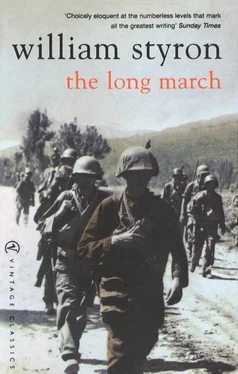William Styron - The Long March
Здесь есть возможность читать онлайн «William Styron - The Long March» весь текст электронной книги совершенно бесплатно (целиком полную версию без сокращений). В некоторых случаях можно слушать аудио, скачать через торрент в формате fb2 и присутствует краткое содержание. Город: New York, Год выпуска: 1952, ISBN: 1952, Издательство: Vintage Classics, Жанр: prose_military, на английском языке. Описание произведения, (предисловие) а так же отзывы посетителей доступны на портале библиотеки ЛибКат.
- Название:The Long March
- Автор:
- Издательство:Vintage Classics
- Жанр:
- Год:1952
- Город:New York
- ISBN:978-0099422792
- Рейтинг книги:3 / 5. Голосов: 1
-
Избранное:Добавить в избранное
- Отзывы:
-
Ваша оценка:
- 60
- 1
- 2
- 3
- 4
- 5
The Long March: краткое содержание, описание и аннотация
Предлагаем к чтению аннотацию, описание, краткое содержание или предисловие (зависит от того, что написал сам автор книги «The Long March»). Если вы не нашли необходимую информацию о книге — напишите в комментариях, мы постараемся отыскать её.
The Long March — читать онлайн бесплатно полную книгу (весь текст) целиком
Ниже представлен текст книги, разбитый по страницам. Система сохранения места последней прочитанной страницы, позволяет с удобством читать онлайн бесплатно книгу «The Long March», без необходимости каждый раз заново искать на чём Вы остановились. Поставьте закладку, и сможете в любой момент перейти на страницу, на которой закончили чтение.
Интервал:
Закладка:
It had been perhaps a court-martial offense, at least worthy of some reprimand, but that was all there was to it. Nothing happened, no repercussions, nothing. The thing had been forgotten; either that, or it had been stored away in the universal memory of colonels, where all such incidents are sorted out for retribution, or are forgotten. Whatever effect it had on the colonel, or whatever higher, even more important sources got wind of it, it had its effect on Mannix. And the result was odd. Far from giving the impression that he had been purged, that he had blown off excess pressure, he seemed instead more tense, more embittered, more in need to scourge something—his own boiling spirit, authority, anything.
Culver’s vision of him at this time was always projected against Heaven’s Gate, which was the name—no doubt ironically supplied at first by the enlisted men—of the pleasure-dome ingeniously erected amid a tangle of alluvial swampland, and for officers only. He and Mannix lived in rooms next to each other, in the bachelor quarters upstairs. The entire area was a playground which had all the casual opulence of a Riviera resort and found its focus in the sparkling waters of a swimming pool, set like an oblong sapphire amid flowered walks and a fanciful growth of beach umbrellas. There, at ten minutes past four each day, Mannix could be found, his uniform shed in an instant and a gin fizz in his hand—a sullen, mountainous figure in a lurid sportshirt, across which a squadron of monstrous butterflies floated in luminous, un-military files. Both Mannix and Culver hated the place—its factitious luxury, its wanton atmosphere of alcohol and torpid ease and dances, the vacant professional talk of the regular officers and the constant teasing presence of their wives, who were beautiful and spoke in tender drawls and boldly flaunted at the wifeless reserves—in a proprietary, Atlanta-debutante fashion—their lecherous sort of chastity. The place seemed to offer up, like a cornucopia, the fruits of boredom, of foot-lessness and dissolution. It was, in Mannix’s words, like a prison where you could have anything you wanted except happiness, and once, in a rare midnight moment when he allowed himself to get drunk, he got paper and wood together from his room and announced to Culver in an unsteady but determined voice that he was going to burn the place down. Culver held him off, but it was true: they were bound to the pleasures of the place by necessity—for there was no place to go for a hundred miles, even if they had wanted to go —and therefore out of futility. “Goddam, it’s degrading,” Mannix had said, making use of an adjective which indeed seemed to sum it all up. “It’s like sex now. Or the lack of it. Now maybe it’s all right for a kid to go without sex, but it’s degrading for someone like me almost thirty to go without making love for so long. It’s simply degrading, that’s all. I’d go for one of these regulars’ pigs if it wasn’t for Mimi… . This whole mess is degrading. I know it’s my own fault I stayed in the reserves, Jack, you don’t have to tell me that. I was a nut. I didn’t know I was going to get called out for every frigging international incident that came along. But, goddam, it’s degrading”—and with a glum, subdued gesture he’d down the dregs of his drink— “it’s degrading for a man my age to go sniffing around on my belly in the boondocks like a dog. And furthermore—” He looked scornfully about him, at the glitter and chrome, at the terrace by the pool where Japanese lanterns hung like a grove of pastel moons, and a girl’s shrill and empty laugh uncoiled as bright as tinsel through the sluggish coastal dusk. It was a silent moment in a night sprinkled with a dusty multitude of Southern stars, and the distant bleating saxophone seemed indecisive and sad, like the nation and the suffocating summer, neither at peace nor at war. “Furthermore, it’s degrading to come out of the field each day and then be forced to go to a night club like this, when all you want to do is go home to your wife and family. Goddam, man, I’ve gotta get out!”
But underneath his rebellion, Culver finally knew, Mannix—like all of them—was really resigned. Born into a generation of conformists, even Mannix (so Culver sensed) was aware that his gestures were not symbolic, but individual, therefore hopeless, maybe even absurd, and that he was trapped like all of them in a predicament which one personal insurrection could, if anything, only make worse. “You know,” he said once, “I think I was really afraid just one time last war.” The phrase “last war” had had, itself, a numb, resigned quality, in its lack of any particular inflection, like “last week end,” or “last movie I went to see.” They had been lying on the beach to which they fled each hot week end. In that setting of coast and sea and lugubrious solitude they felt nearly peaceful, in touch with a tranquil force more important, and more lasting (or so it seemed on those sunlit afternoons), than war. Mannix had been, almost for the first time since Culver had known him, rested and subdued, and the sound of his voice had been a surprise after long, sun-laden hours of sleep and silence. “That’s the goddam truth,” he said thoughtfully, “I was only afraid once. Really afraid, I mean. It was at a hotel in San Francisco. I think I really came closer to dying that night than I ever have in my life. We were drunk, you see, polluted, all of us. I think there were five of us, all of us boots just out of Dago. Kids. We were on the tenth floor of this hotel and in this room and I believe we were about as drunk as anyone could get. I remember going in to take a shower in the bathroom. It was late at night, past midnight, and after I took this shower, you see, I came out into the room buck naked. Two of those drunk guys were waiting for me. They grabbed me and pushed me toward the window. I was so loaded I couldn’t battle. Then they pushed me out the window and held me by the heels while I dangled upside-down buck naked in space, ten floors above the street.” He paused and sucked at a beer can. “Can you imagine that?” he went on slowly. “How I felt? I got stone-sober in a second. Imagine being that high upside-down in space with two drunks holding onto your heels. I was heavy, man, just like now, you see. All I can remember is those teeny-weeny lights below and the tiny little people like ants down there and those two crazy drunk guys holding onto my wet slippery ankles, laughing like hell and trying to decide whether to let go or not. I just remember the cold wind blowing on my body and that dark, man, infinite darkness all around me, and my ankles beginning to slip out of their hands. I really saw Death then, and I think that all I could think of was that I was going to fall and smash myself on that hard, hard street below. That those crazy bastards were going to let me fall. I was praying, I guess. I remember the blood rushing to my brain and my ankles slipping, and that awful strange noise. And I was reaching out, man, clutching at thin air. Then I wondered what that noise was, that high loud noise, and then I realized it was me, screaming at the top of my voice, all over San Francisco.” He stopped talking then and scuffed at the sand with one calloused heel. “They hauled me up somehow. It was those sober guys—I guess they were sober—the other two. They got me up. But every time I remember that moment a great big cold shudder runs up and down my spine.” He chuckled and chewed on his cigar but the laugh was half-hearted and listless, and he dug his elbows into the sand and resumed his quiet, placid gaze toward the horizon. Culver watched him: his bitterness dissolved in the hot salty air, slumped in the sand gazing wistfully out to sea, sun-glassed, hairy-chested, a cigar protruding from his face and a beer can warming in his hand, he seemed no longer the man who could sicken himself with resentment, but relaxed, pliable even, like a huge hairy baby soothed by the wash of elemental tides, ready to receive anything, all, into that great void in his soul which bitterness and rebellion had briefly left vacant—all—the finality of more suffering, or even death. War was in the offing. A promenade of waves, snow-crowned like lovely garlands in the dark hair of girls, swelled eastward toward Africa: past those smoky heights, more eastward still, the horizon seemed to give back repeated echoes of the sea, like far-off thunder, or guns. Culver remembered making a quick, contorted motion in the sand with his body, and being swept by a hot wave of anguish. It was loneliness and homesickness, but it was also fright. Across the rim of his memory two little girls playing on the sunny grass waved to him, were gone, pursued by a shower of uncap-turable musical sounds. Mannix’s resigned silence fed his loneliness. Suddenly he felt, like Mannix, upturned drunkenly above the abyss, blood rushing to his head, in terror clutching at the substanceless night….
Читать дальшеИнтервал:
Закладка:
Похожие книги на «The Long March»
Представляем Вашему вниманию похожие книги на «The Long March» списком для выбора. Мы отобрали схожую по названию и смыслу литературу в надежде предоставить читателям больше вариантов отыскать новые, интересные, ещё непрочитанные произведения.
Обсуждение, отзывы о книге «The Long March» и просто собственные мнения читателей. Оставьте ваши комментарии, напишите, что Вы думаете о произведении, его смысле или главных героях. Укажите что конкретно понравилось, а что нет, и почему Вы так считаете.






![Джеффри Арчер - The Short, the Long and the Tall [С иллюстрациями]](/books/388600/dzheffri-archer-the-short-the-long-and-the-tall-s-thumb.webp)





